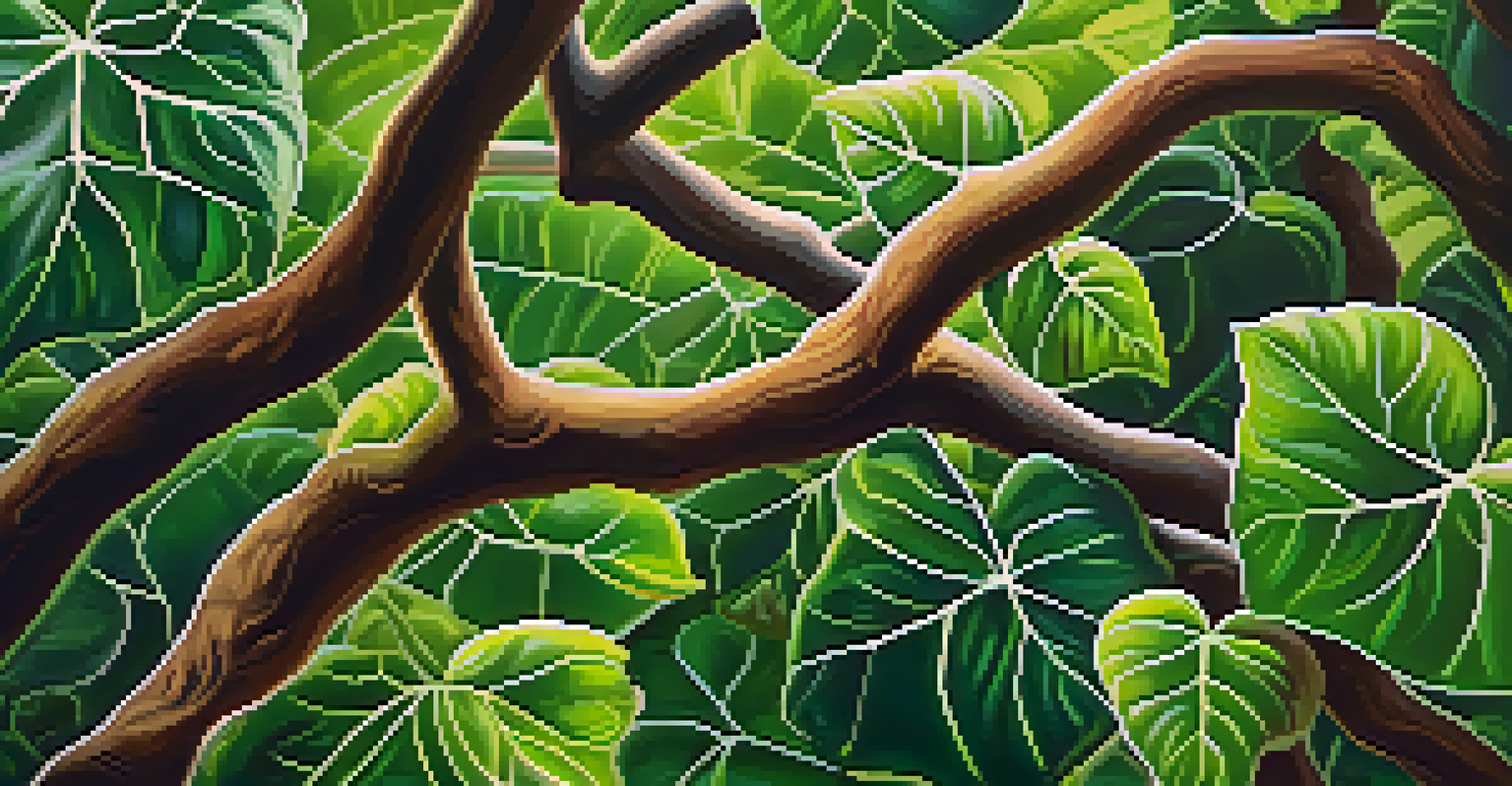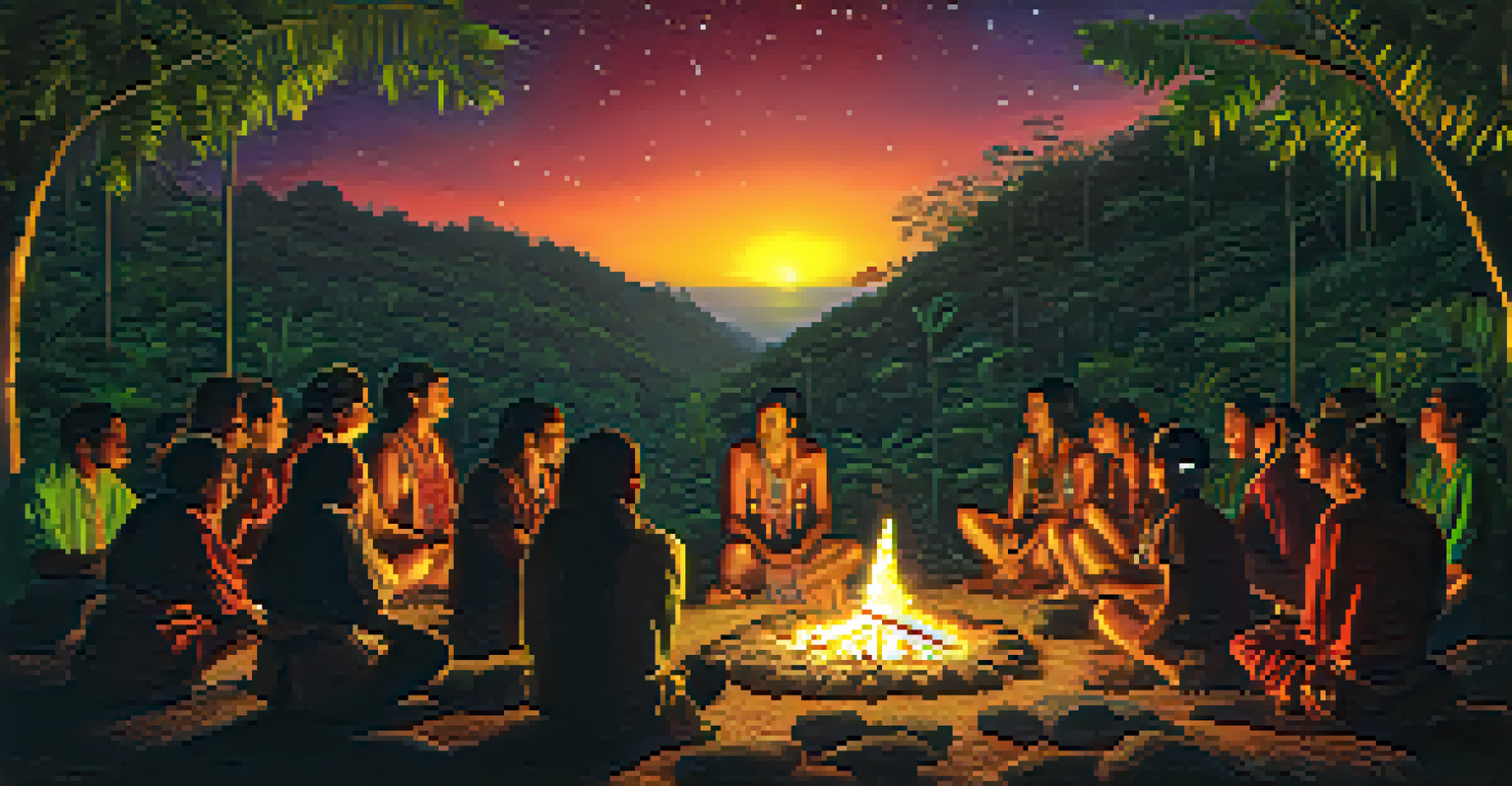Ayahuasca's Role in Amazonian Healing Traditions and Rituals

Understanding Ayahuasca: The Plant and Its Significance
Ayahuasca is a powerful brew made primarily from the Banisteriopsis caapi vine and the Psychotria viridis leaf. In Amazonian cultures, it’s not just a drink; it’s a gateway to spiritual and physical healing. The word 'ayahuasca' translates to 'vine of the soul,' highlighting its deep connection to the human experience.
The greatest gift of the Ayahuasca is the understanding of who we are and the realization of our own divine nature.
For generations, indigenous tribes have revered Ayahuasca for its psychoactive properties, which facilitate profound introspection and connection to the spiritual realm. This brew is often used in shamanic rituals, where the shaman guides participants through their journeys, ensuring a safe and meaningful experience. It's more than a means of getting high; it's a sacred rite of passage.
As cultural interest in Ayahuasca grows globally, understanding its origins and significance becomes crucial. It's essential to recognize that this tradition is rooted in respect for nature and spiritual beliefs, offering a lens into the rich tapestry of Amazonian life.
The Healing Properties of Ayahuasca in Traditional Practices
Ayahuasca is celebrated not only for its spiritual insights but also for its potential healing properties. Many participants report significant improvements in mental health conditions, such as depression and anxiety, often attributing these changes to their Ayahuasca experiences. The brew is thought to help cleanse the mind and spirit, allowing individuals to confront and release deep-seated traumas.

In traditional Amazonian healing, shamans play a pivotal role, using their knowledge of plants and spiritual practices to guide individuals through the Ayahuasca journey. This mentorship helps participants navigate their experiences, making sense of visions and emotions that arise during the ceremony. The shaman’s songs, or icaros, are integral in this process, acting as spiritual tools to enhance the healing experience.
Ayahuasca's Healing Traditions
Ayahuasca is revered for its potential to improve mental health and facilitate spiritual healing through guided ceremonies.
Furthermore, the communal aspect of these rituals fosters a sense of belonging and support among participants. This creates an environment where healing can thrive, as shared experiences often lead to collective understanding and growth.
Ceremonial Context: Rituals Surrounding Ayahuasca
Ayahuasca ceremonies are rich in symbolism and tradition, typically conducted at night in a natural setting, such as a jungle or a ceremonial hut. The environment plays a crucial role in creating a sacred space conducive to healing and introspection. Participants often gather in a circle, reinforcing the communal nature of the experience as they prepare to embark on their journey together.
Ayahuasca is not a drug, it is a teacher, a guide to the inner self.
The rituals are often preceded by a period of dieta, where participants follow specific dietary restrictions to purify their bodies and minds. This preparation is crucial, as it allows individuals to approach the Ayahuasca experience with clarity and openness. During the ceremony, the shaman leads participants in chants and prayers, setting the intention for the journey ahead.
As the effects of Ayahuasca take hold, participants may experience vivid visions, emotional releases, or encounters with spiritual entities. Each person's journey is unique, contributing to a tapestry of experiences that reflect the diverse understanding of healing within Amazonian traditions.
Cultural Significance of Ayahuasca in Amazonian Communities
In Amazonian communities, Ayahuasca is more than just a substance; it embodies a deep cultural identity and worldview. The brew is often used to address communal issues, like conflict resolution, illustrating how interconnectedness is central to these societies. Elders and shamans are respected figures, as their knowledge of Ayahuasca shapes the community’s values and practices.
Moreover, Ayahuasca ceremonies are often seen as vital rites of passage, helping individuals navigate life transitions such as puberty, marriage, or the loss of a loved one. These experiences provide a framework for understanding life’s complexities and fostering resilience within the community. The importance of storytelling and shared experiences further cements the role of Ayahuasca in cultural identity.
Cultural Importance in Amazonia
In Amazonian communities, Ayahuasca serves as a vital cultural symbol and is integral to communal healing and rites of passage.
As globalization influences traditional practices, it's essential to approach Ayahuasca with respect and understanding. Misappropriation of these sacred traditions can undermine their significance and the wisdom they carry.
Scientific Perspectives on Ayahuasca and Healing
Recent years have seen a surge in scientific interest in Ayahuasca and its potential therapeutic benefits. Researchers are exploring how the brew affects brain chemistry, particularly regarding serotonin and neuroplasticity. These studies aim to uncover the mechanisms behind the reported improvements in mental health, providing a bridge between traditional healing and modern science.
Moreover, clinical trials have begun to investigate the efficacy of Ayahuasca in treating conditions such as PTSD and addiction. These studies highlight the potential of integrating traditional practices into contemporary mental health treatment paradigms. However, it's crucial to conduct this research ethically, ensuring that indigenous practices are respected and not exploited.
The dialogue between science and tradition opens up new avenues for understanding the human experience, emphasizing the importance of holistic approaches to healing. By bridging these worlds, we can gain deeper insights into both the biochemical and spiritual aspects of well-being.
Challenges and Ethical Considerations in Ayahuasca Use
As Ayahuasca gains popularity outside of its indigenous context, several challenges and ethical issues have emerged. One prominent concern is the potential for cultural appropriation, where individuals or organizations may exploit Ayahuasca traditions without proper respect or understanding. This can lead to diluted practices and the commodification of what is considered sacred by indigenous communities.
Furthermore, the safety of participants is a significant issue, especially in unregulated settings. There have been reports of adverse reactions and even fatalities linked to poorly administered ceremonies. It highlights the importance of choosing reputable facilitators who prioritize participant safety and adhere to traditional practices.
Scientific Research on Ayahuasca
Growing scientific interest in Ayahuasca aims to explore its therapeutic benefits, bridging traditional practices with modern mental health approaches.
Addressing these challenges requires a collaborative approach, emphasizing respect, education, and ethical engagement with indigenous cultures. By fostering dialogue and understanding, we can navigate the complexities surrounding Ayahuasca use in a way that honors its rich heritage.
The Future of Ayahuasca in Healing Traditions
Looking ahead, the role of Ayahuasca in healing traditions appears both promising and complex. As interest in alternative therapies grows, Ayahuasca has the potential to contribute to a broader understanding of mental health and well-being. However, it’s essential to approach this future with a commitment to ethical practices and respect for indigenous cultures.
The ongoing dialogue between traditional knowledge and scientific inquiry can enrich our understanding of healing. By embracing a holistic approach that values both perspectives, we can create a more inclusive narrative around Ayahuasca and its benefits. This requires transparency, collaboration, and a genuine desire to learn from those who have honored these traditions for centuries.

Ultimately, the future of Ayahuasca will depend on our ability to navigate these complexities responsibly. By fostering respect and understanding, we can ensure that this ancient practice continues to provide healing and insight for generations to come.